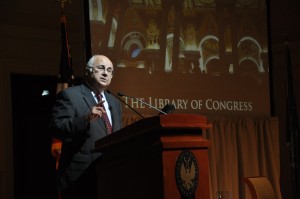You’ve heard, no doubt, about the Great Library of Alexandria, Egypt, which was destroyed in a fire back in antiquity. (There are still debates about who torched it and why. We’ll probably never know.)

Ismail Serageldin of the Bibliotheca Alexandrina speaks at the First International Summit of the Book in December
You may also have heard that the national library of Egypt – the Bibliotheca Alexandrina – was rebuilt in an architecturally and intellectually marvelous way a little more than a decade ago, and is under the direction of Ismail Serageldin, a renowned thinker, writer and speaker.
Dr. Serageldin, at the invitation of Librarian of Congress James H. Billington, will give two public lectures at the Library of Congress on Friday, March 8. The first talk – at noon in Room 119 of the Library’s Thomas Jefferson Building at 10 First St., S.E. in Washington, D.C. – will be on “The Loss and Rebirth of the Library of Alexandria.” The second lecture, in the Library’s Coolidge Auditorium on the ground floor of the Thomas Jefferson Building, will take place at 7 p.m. following a reception at 6:30 p.m. in the Library’s Great Hall. Serageldin will speak on the topic “The Knowledge Revolution and the Future of Libraries.” These lectures will be free and open to the public; no tickets are necessary.
“I am delighted that my friend and fellow explorer of the life of the mind will return to the Library of Congress to share his insights,” said Billington, who invited Serageldin to deliver the March lectures following the First International Summit of the Book in December, an event held at the Library of Congress that Serageldin keynoted. (You can see that speech here.)
Serageldin, in addition to directing his nation’s library, also chairs the boards of directors for each of the Bibliotheca Alexandrina’s affiliated research institutes and museums. He serves as chair and member of a number of advisory committees for academic, research, scientific and international institutions and civil-society efforts which includes the Institut d’Egypte (Egyptian Academy of Science), U.S. National Academy of Sciences (Public Welfare Medalist), the American Philosophical Society, TWAS (Academy of Sciences for the Developing World), the Indian National Academy of Agricultural Sciences and the European Academy of Sciences and Arts.
He is former chairman of the Consultative Group on International Agricultural Research (CGIAR, 1994-2000), founder and former chairman of the Global Water Partnership (GWP, 1996-2000) and the Consultative Group to Assist the Poorest (CGAP), a microfinance program (1995-2000) and was professor of the International Savoirs Contre Pauvreté (Knowledge Against Poverty), at Collège de France, Paris, and distinguished professor at Wageningen University in the Netherlands.
He has also served in a number of capacities at the World Bank, including as vice president for environmentally and socially sustainable development (1992-1998), and for special programs (1998-2000). He has published more than 60 books and monographs and over 200 papers on a variety of topics including biotechnology, rural development, sustainability, and the value of science to society.
He holds a Bachelor of Science degree in engineering from Cairo University and master’s degree and a Ph.D. from Harvard University; he has received 33 honorary doctorates
Come to these excellent – and free – events!
